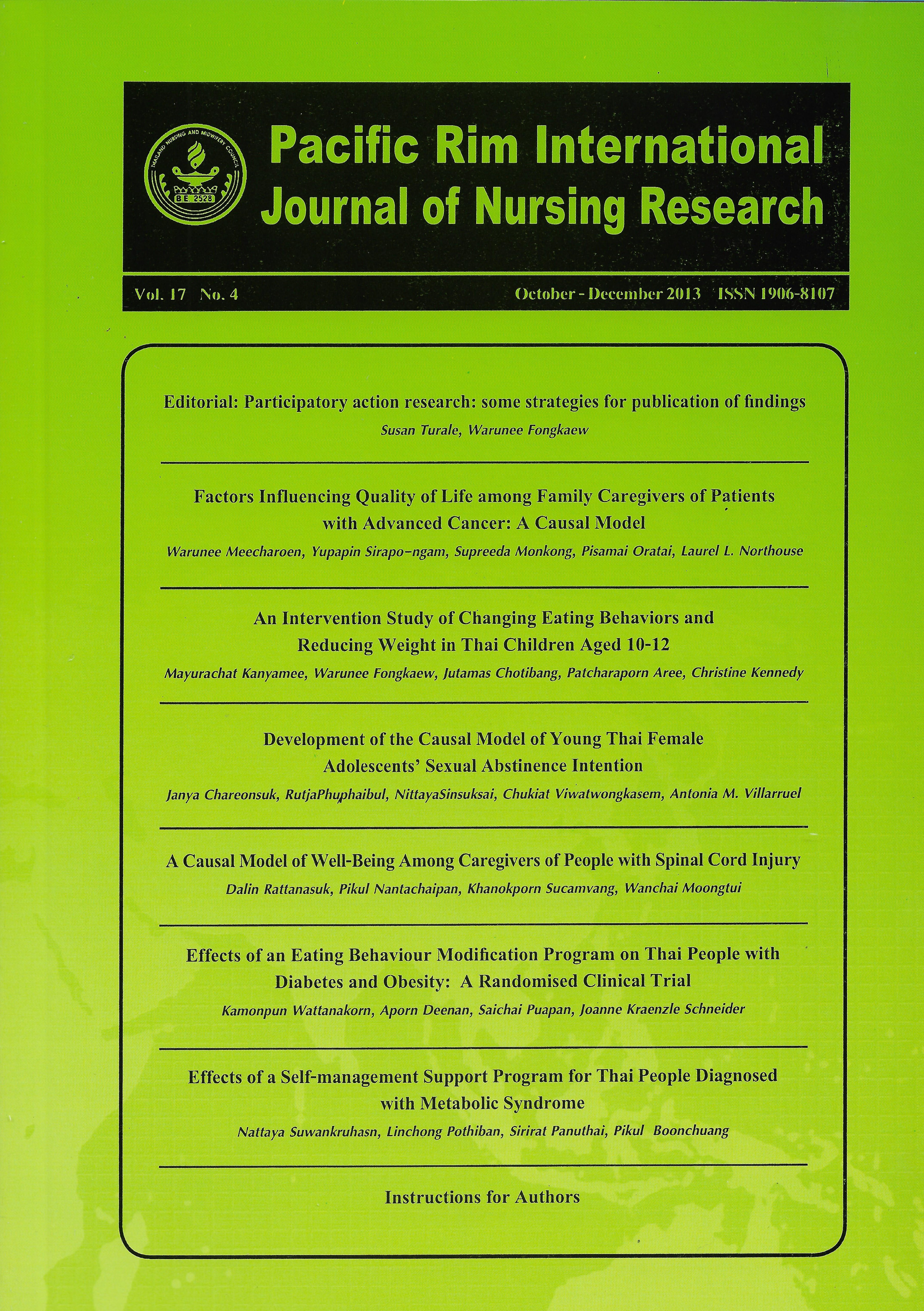Effects of an Eating Behaviour Modification Program on Thai People with Diabetes and Obesity: A Randomised Clinical Trial
Keywords:
Eating Behavioral Modification program, illness representations, eating behaviors, physiologic outcomes, obese diabetesAbstract
The purpose of this study was to evaluate the effects of an Eating Behaviour Modification Program on Thai people with diabetes and obesity. Based on motivational interviewing and self-regulation theory, the Program was developed to improve healthy eating behaviours. A sample of 76 people with diabetes and obesity were recruited using a cluster random sampling, then randomly assigned to a intervention or control group. The intervention group participated in four sessions which took 30-45 minutes per session, whereas the control group received materials and health education. The outcomes were evaluated using the Brief Illness Perception Questionnaire, the Three-Factor Eating Questionnaire, and the Seven-Day Physical Activity Recall questionnaire at weeks 0, 5, 9, and 13.
The results revealed that the intervention group had significantly higher scores on illness representations and eating behaviours and a significantly lower body mass index, body fat percentage, waist circumference, and blood sugar levels than the control group. Moreover, there were significant differences over times for all outcomes. These findings support our contention that the Program was effective in promoting motivation, maintaining healthy eating behaviours, and may be used in nursing practice. However nursing research should be undertaking using this Program with different groups and across longer time periods.
บทคัดย่อ : การศึกษาครั้งนี้ มีวัตถุประสงค์เพื่อทดสอบผลของโปรแกรมปรับเปลี่ยนพฤติกรรมการบริโภคอาหารของผู้ป่วยโรคเบาหวานคนไทยที่มีภาวะอ้วนโดยการประยุกต์ใช้เทคนิคการสัมภาษณ์เพื่อเสริมสร้างแรงจูงใจและทฤษฎีการกำกับตนเองเป็นกรอบในการศึกษา กลุ่มตัวอย่างเป็นผู้ป่วยเบาหวานที่มีภาวะอ้วน จำนวน 76 รายที่ถูกสุ่มตัวอย่างแบบกลุ่ม แล้วสุ่มเข้ากลุ่มทดลองและกลุ่มควบคุม กลุ่มทดลองได้รับโปรแกรมเป็นการสนทนารายบุคคล จำนวน 4 ครั้งๆละ 30-45 นาที กลุ่มควบคุมได้รับเอกสารและการสอนสุขศึกษา เครื่องมือที่ใช้ในการเก็บรวบรวมข้อมูลประกอบด้วย แบบสอบถามข้อมูลส่วนบุคคล แบบสอบถามการรับรู้เกี่ยวกับความอ้วนสำหรับผู้ป่วยโรคเบาหวาน แบบสอบถามปัจจัยที่เกี่ยวข้องกับการบริโภคอาหารและแบบสัมภาษณ์การทำกิจกรรมที่ใช้แรงกายในช่วง 7 วันที่ผ่านมา ซึ่งใช้ประเมินในสัปดาห์ที่ 0, 5, 9 และ 13
ผลการศึกษาพบว่ากลุ่มทดลองมีคะแนนเฉลี่ยของตัวแปรที่ศึกษาสูงกว่ากลุ่มควบคุมอย่างมีนัยสำคัญทางสถิติ ได้แก่ การรับรู้การเจ็บป่วย พฤติกรรมการบริโภคอาหาร นอกจากนั้นยังพบว่ากลุ่มทดลองมีดัชนีมวลกาย เปอร์เซ็นต์ไขมันในร่างกาย เส้นรอบเอวและระดับน้ำตาลในเลือดต่ำกว่ากลุ่มควบคุมอย่างมีนัยสำคัญทางสถิติ และผลการวิเคราะห์ทางสถิติพบว่ามีความแตกต่างอย่างมีนัยสำคัญทางสถิติของตัวแปรผลลัพธ์ในช่วงเวลาที่เปลี่ยนแปลงไป จากผลการศึกษาสนับสนุนว่าโปรแกรมปรับเปลี่ยนพฤติกรรมการบริโภคอาหารสามารถช่วยส่งเสริมให้ผู้ป่วยเกิดแรงจูงใจปรับเปลี่ยนพฤติกรรมการบริโภคอาหารแบบยั่งยืน และสามารถนำไปใช้ในการปฏิบัติการพยาบาลได้ จึงควรมีการศึกษาเพิ่มเติมในกลุ่มผู้ป่วยอื่นๆ และใช้โปรแกรมในระยะยาวขึ้น
Downloads
Published
How to Cite
Issue
Section
License
Copyright: The Pacific Rim International Journal of Nursing Research, Thailand Nursing & Midwifery Council has exclusive rights to publish, reproduce and distribute the manuscript and all contents therein.








.png)



